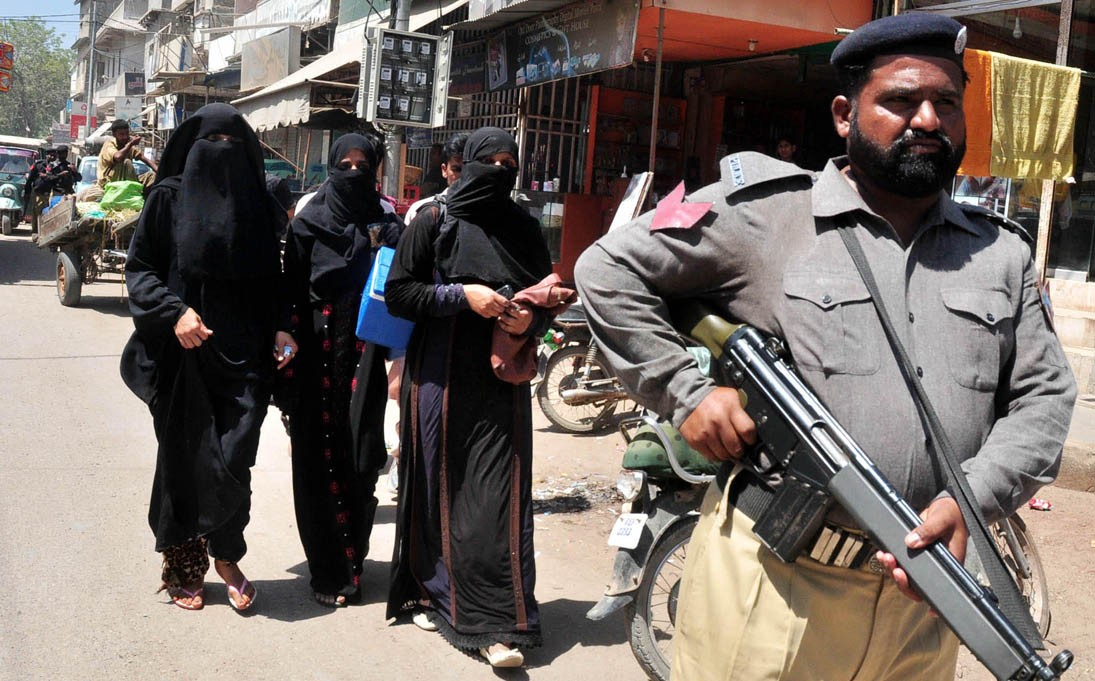
Despite dire efforts to protect the polio campaign, attacks on policemen providing cover to polio vaccinators continue

On April 20, Anwaar Ali, 33, an anti-polio vaccinator, was busy administering vaccine when eight armed men killed seven policemen deputed to guard the anti-polio vaccinators in two separate attacks in Karachi’s Orangi Town.
Jamaat-ul-Ahrar, a breakaway faction of the Tehreek-e-Taliban Pakistan (TTP), claimed responsibility for the killings.
Police officials and Emergency Operation Centre (EOC), a Sindh government body that supervises the anti-polio campaign, say the killings of seven policemen are part of a renewed wave of attacks on law-enforcement personnel in the city. But Ali thinks differently, "Rangers-led operation in Karachi that started in September 2013 may have weakened the Taliban militants by killing and arresting their key leaders and cadres but the recent attack shows they are still capable of carrying out hit-and-run operations."
In the past, anti-polio teams have come under attack in various neighbourhoods, including Sohrab Goth, Gulshan-e-Maymar, Landhi, Baldia Town, Orangi Town and Qayyumabad. Factions of the TTP were found involved in most of these attacks. The killings of vaccinators have not been reported since January 21, 2014, when three polio vaccinators were targeted in Qayyum Abad nieghbourhood. However, police personnel deputed to guard them continue to be killed.
Commissioner Karachi, Syed Asif Haider Shah, says policemen were the target in the recent Orangi Town killings and not anti-polio vaccinators. "That’s the reason we did not suspend the polio eradication campaign," he tells TNS.
On the contrary, officials of the polio eradication campaign believe policemen were killed because they were guarding anti-polio vaccinators. "It shows attackers’ key target was the polio campaign," says an official, requesting anonymity.
At least 95 policemen have been killed in the last 16 months in Karachi, police statistics show. Raja Umar Khattab, a senior police official, who oversees counter-terrorism operations in the city, says a certain militant group has been involved in all the attacks on police. "The group is involved in targeted killing of at least 27 people, including leaders of the Awami National Party and the Mutahida Qaumi Movement," he adds.
The government has set a target to make Pakistan polio-free by 2016 by reaching out to every child. There has been a drastic reduction in the number of reported polio cases in 2015, from 306 recorded in 2014 to 51 in 2015, according to official statistics. This is the lowest-ever count recorded since 2009.
The government not only set up the EOC in October 2014 but also formed a separate police force to protect anti-polio medics. According to media reports, 4,600 police personnel drawn from the Special Security Unit, Rapid Response Force Sindh, Counter Terrorism Department, Anti-Encroachment Cell and various police training schools constitute the force.
Anti-polio medics and security experts complain that mostly under-trained recruits from police training schools and personnel from anti-encroachment cells are sent to guard polio vaccinators.
A senior anti-polio official who oversees security affairs, say the attackers are well-trained and know the areas where they carry out attacks but police personnel who are tasked to protect anti-polio teams are brought from rural Sindh and are untrained. "In the April 20 attacks, the killed policemen were brought from Shahadpur training centre to perform their duties in a sensitive area of Orangi Town. Well-organised, well-armed and well-trained militants attacked them and they could not even return a single fire," he adds.
Similarly, in January last year, unidentified men attacked two policemen guarding anti-polio vaccinators in separate attacks in Nazimabad and Orangi Town. One was killed while the other was severely injured. Both cops were under-training recruits.
Police officials say that due to the shortage of policemen, they are compelled to deploy personnel from different cells and training schools to provide security to the anti-polio campaign.
A total of 95 attacks were recorded on polio teams and law-enforcement personnel in the country since 2012. As many as 37 anti-polio vaccinators and 57 law-enforcement personnel have been killed in these attacks. Out of them, 41 were carried out by militants in Khyber Pakhtunkhwa, 18 in Fata, 16 in Balochistan, 13 in Sindh and five were reported in Punjab.
The first attack on anti-polio campaign was reported in July 2012, when unidentified gunmen had fired at a World Health Organisation (WHO) vehicle in Karachi’s Gadap area, injuring a Ghanaian doctor and his driver.
Analysts who oversee the vaccination campaign believe assigning a number of policemen to protect anti-polio medics creates further misconception among the communities, especially Pashtuns. "It creates a perception that children are being vaccinated by force, that their parents have no rights in the matter," writes Fawad Ali Shah, a PhD scholar specialising in health communication, in an English daily.